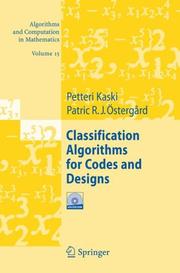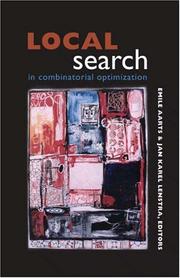| Listing 1 - 6 of 6 |
Sort by
|
Book
ISBN: 1280460938 9786610460939 3540289917 Year: 2006 Publisher: Berlin ; New York : Springer,
Abstract | Keywords | Export | Availability | Bookmark
 Loading...
Loading...Choose an application
- Reference Manager
- EndNote
- RefWorks (Direct export to RefWorks)
A new starting-point and a new method are requisite, to insure a complete [classi?cation of the Steiner triple systems of order 15]. This method was furnished, and its tedious and di?cult execution und- taken, by Mr. Cole. F. N. Cole, L. D. Cummings, and H. S. White (1917) [129] The history of classifying combinatorial objects is as old as the history of the objects themselves. In the mid-19th century, Kirkman, Steiner, and others became the fathers of modern combinatorics, and their work – on various objects, including (what became later known as) Steiner triple systems – led to several classi?cation results. Almost a century earlier, in 1782, Euler [180] published some results on classifying small Latin squares, but for the ?rst few steps in this direction one should actually go at least as far back as ancient Greece and the proof that there are exactly ?ve Platonic solids. One of the most remarkable achievements in the early, pre-computer era is the classi?cation of the Steiner triple systems of order 15, quoted above. An onerous task that, today, no sensible person would attempt by hand calcu- tion. Because, with the exception of occasional parameters for which com- natorial arguments are e?ective (often to prove nonexistence or uniqueness), classi?cation in general is about algorithms and computation.
Combinatorial group theory. --- Combinatorial analysis. --- Combinatorics --- Algebra --- Mathematical analysis --- Combinatorial groups --- Groups, Combinatorial --- Combinatorial analysis --- Group theory --- Combinatorics. --- Computer science --- Coding theory. --- Telecommunication. --- Computational Mathematics and Numerical Analysis. --- Coding and Information Theory. --- Communications Engineering, Networks. --- Signal, Image and Speech Processing. --- Mathematics. --- Electric communication --- Mass communication --- Telecom --- Telecommunication industry --- Telecommunications --- Communication --- Information theory --- Telecommuting --- Data compression (Telecommunication) --- Digital electronics --- Machine theory --- Signal theory (Telecommunication) --- Computer programming --- Computer mathematics --- Discrete mathematics --- Electronic data processing --- Mathematics --- Computer mathematics. --- Information theory. --- Electrical engineering. --- Signal processing. --- Image processing. --- Speech processing systems. --- Communication theory --- Cybernetics --- Computational linguistics --- Electronic systems --- Modulation theory --- Oral communication --- Speech --- Telecommunication --- Singing voice synthesizers --- Pictorial data processing --- Picture processing --- Processing, Image --- Imaging systems --- Optical data processing --- Processing, Signal --- Information measurement --- Electric engineering --- Engineering

ISBN: 3540289909 9783540289906 Year: 2006 Publisher: Berlin : Springer,
Abstract | Keywords | Export | Availability | Bookmark
 Loading...
Loading...Choose an application
- Reference Manager
- EndNote
- RefWorks (Direct export to RefWorks)
Digital
ISBN: 9783540289913 Year: 2006 Publisher: Berlin, Heidelberg Springer
Abstract | Keywords | Export | Availability | Bookmark
 Loading...
Loading...Choose an application
- Reference Manager
- EndNote
- RefWorks (Direct export to RefWorks)
Ergodic theory. Information theory --- Discrete mathematics --- Mass communications --- Computer. Automation --- beeldverwerking --- coderen --- discrete wiskunde --- informatica --- wiskunde --- communicatietechnologie --- informatietheorie --- signaalverwerking
Book
ISBN: 9512216965 9789512216963 Year: 1993 Publisher: Espoo: Helsinki university of technology,
Abstract | Keywords | Export | Availability | Bookmark
 Loading...
Loading...Choose an application
- Reference Manager
- EndNote
- RefWorks (Direct export to RefWorks)
Book

ISBN: 9780691187563 Year: 2018 Publisher: Princeton, NJ
Abstract | Keywords | Export | Availability | Bookmark
 Loading...
Loading...Choose an application
- Reference Manager
- EndNote
- RefWorks (Direct export to RefWorks)


ISBN: 9780691187563 9780691115221 Year: 2018 Publisher: Princeton, N.J. Princeton University Press
Abstract | Keywords | Export | Availability | Bookmark
 Loading...
Loading...Choose an application
- Reference Manager
- EndNote
- RefWorks (Direct export to RefWorks)
| Listing 1 - 6 of 6 |
Sort by
|

 Search
Search Feedback
Feedback About UniCat
About UniCat  Help
Help News
News